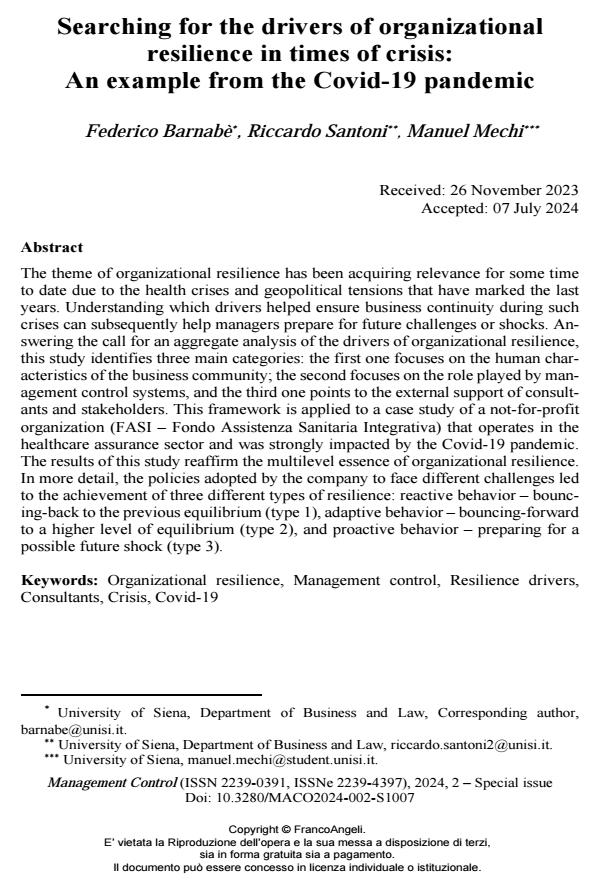Searching for the drivers of organizational resilience in times of crisis: An example from the Covid-19 pandemic
Titolo Rivista MANAGEMENT CONTROL
Autori/Curatori Federico Barnabè, Riccardo Santoni, Manuel Mechi
Anno di pubblicazione 2024 Fascicolo 2024/2 Suppl.
Lingua Inglese Numero pagine 24 P. 125-148 Dimensione file 314 KB
DOI 10.3280/MACO2024-002-S1007
Il DOI è il codice a barre della proprietà intellettuale: per saperne di più
clicca qui

FrancoAngeli è membro della Publishers International Linking Association, Inc (PILA), associazione indipendente e non profit per facilitare (attraverso i servizi tecnologici implementati da CrossRef.org) l’accesso degli studiosi ai contenuti digitali nelle pubblicazioni professionali e scientifiche.
The theme of organizational resilience has been acquiring relevance for some time to date due to the health crises and geopolitical tensions that have marked the last years. Understanding which drivers helped ensure business continuity during such crises can subsequently help managers prepare for future challenges or shocks. Answering the call for an aggregate analysis of the drivers of organizational resili-ence, this study identifies three main categories: the first one focuses on the hu-man characteristics of the business community; the second focuses on the role played by management control systems, and the third one points to the external support of consultants and stakeholders. This framework is applied to a case study of a not-for-profit organization (FASI – Fondo Assistenza Sanitaria Integrativa) that operates in the healthcare assurance sector and was strongly impacted by the Covid-19 pandemic. The results of this study reaffirm the multilevel essence of organizational resilience. In more detail, the policies adopted by the company to face different challenges led to the achievement of three different types of resili-ence: reactive behavior – bouncing-back to the previous equilibrium (type 1), adaptive behavior – bouncing-forward to a higher level of equilibrium (type 2), and proactive behavior – preparing for a possible future shock (type 3).
Parole chiave:Organizational resilience, Management control, Resilience drivers, Consultants, Crisis, Covid-19
Federico Barnabè, Riccardo Santoni, Manuel Mechi, Searching for the drivers of organizational resilience in times of crisis: An example from the Covid-19 pandemic in "MANAGEMENT CONTROL" 2 Suppl./2024, pp 125-148, DOI: 10.3280/MACO2024-002-S1007